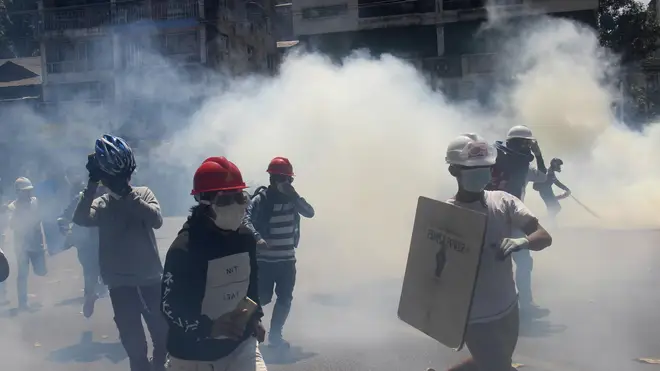
Nick Abbot 10pm - 1am
1 March 2021, 08:24

The UN said it had received credible reports that more than 18 people died during shootings by security forces at the weekend.
Police in Myanmar’s biggest city fired tear gas as defiant crowds returned to the streets to protest against the military’s seizure of power, despite reports that security forces had killed at least 18 people around the country a day earlier.
The protesters in Yangon were chased as they tried to gather at their usual meeting spot at the Hledan Centre intersection.
Demonstrators scattered and sought to rinse their faces with water in vain attempts to ease the effects of the gas.

In the capital, Naypyitaw, the country’s ousted leader Aung San Suu Kyi made a court appearance via video link, according to the independent Myanmar Now online news agency.
It said she received a charge under Section 505(b) of the Penal Code for allegedly inciting unrest. Further details of the court appearance were not immediately available.
Ms Suu Kyi has already been charged with two other offences – possession of walkie-talkies that had been imported without being registered, and violating an order issued under the Natural Disaster Management Law limiting public gatherings in order to fight the spread of the coronavirus.
The 75-year-old Ms Suu Kyi was initially detained by the military at her Naypyitaw residence, but fellow members of her National League for Democracy party are uncertain of her present whereabouts.

If she is convicted, the charges against her could provide a legal way of barring her from running in any election the junta has promised in a year’s time.
At least five people were believed to have been killed in Yangon on Sunday when police shot at the protesters, who are demanding that Suu Kyi’s elected government be restored to power after being ousted in a February 1 coup.
The protesters’ civil disobedience movement has adhered so far to the the tenets of nonviolence despite provocation from the security forces and pro-military counter-demonstrators.
People erected makeshift shrines at the spots where several of the victims were shot and also paid their respects by standing outside the hospitals from which the bodies of the victims were being released to their families.
Earlier, the UN said it has received “credible” reports that 18 people were killed and 30 others were injured after security forces in Myanmar opened fire on Sunday.
Protesters are demanding the return to power of the elected government of Ms Suu Kyi after it was ousted in a coup on February 1.
About 1,000 people are believed to have been detained during demonstrations on Sunday.

The UN Human Rights Office said security forces also used tear gas as well as flash and stun grenades, adding: “Deaths reportedly occurred as a result of live ammunition fired into crowds in Yangon, Dawei, Mandalay, Myeik, Bago and Pokokku.”
An Associated Press journalist was taken into police custody on Saturday morning while providing news coverage of the protests. The journalist, Thein Zaw, remains in custody.
The AP has called for his immediate release.
Ian Phillips, AP vice president for international news, said: “Independent journalists must be allowed to freely and safely report the news without fear of retribution. AP decries in the strongest terms the arbitrary detention of Thein Zaw.”
The Foreign Correspondents’ Club of Myanmar also condemned the arrest.

The Democratic Voice of Burma (DVB) reported that there had been 19 confirmed deaths in nine cities, with another 10 deaths unconfirmed.
The independent media company counted five deaths in Yangon and two in Mandalay, the largest and second-largest cities, respectively.
It registered five deaths in Dawei, a much smaller city in south-eastern Myanmar that has seen tens of thousands of protesters take to the streets nearly every day since the coup.
Confirming the deaths of protesters has been difficult amid the chaos and general lack of news from official sources, especially in areas outside Yangon, Mandalay and the capital of Naypyitaw. But in many cases, photos and video circulated online showed circumstances of the killings and gruesome photos of bodies.

The independent Assistance Association of Political Prisoners reported it was aware that about 1,000 people were detained on Sunday, adding that it was able to identify 270.
That brought the total number of people the group has confirmed as being arrested, charged or sentenced since the coup to 1,132.
Before Sunday, there had been eight confirmed reports of killings linked to the army’s takeover, according to the Assistance Association of Political Prisoners.
UN Secretary-General Antonio Guterres strongly condemned the crackdown, calling the use of lethal force against peaceful protesters and arbitrary arrests “unacceptable”, and expressed serious concern at the increase in deaths and serious injuries, UN spokesman Stephane Dujarric said.
US officials including secretary of state Antony Blinken also condemned the violence.
The February 1 coup reversed years of slow progress towards democracy after five decades of military rule in Myanmar.
Ms Suu Kyi’s National League for Democracy party would have been installed for a second five-year term in office, but the army blocked parliament from convening and detained her and the president, Win Myint, as well as other top members of Ms Suu Kyi’s government.